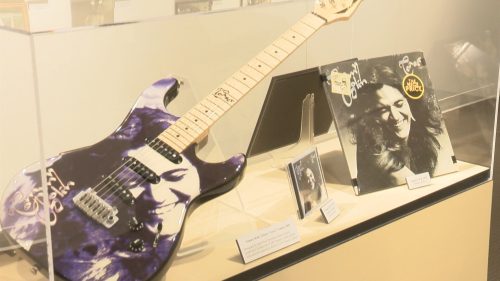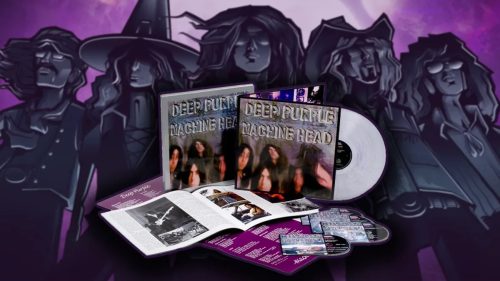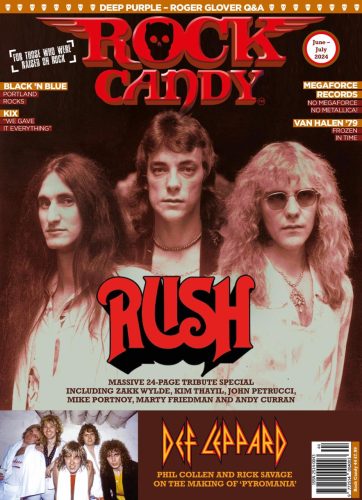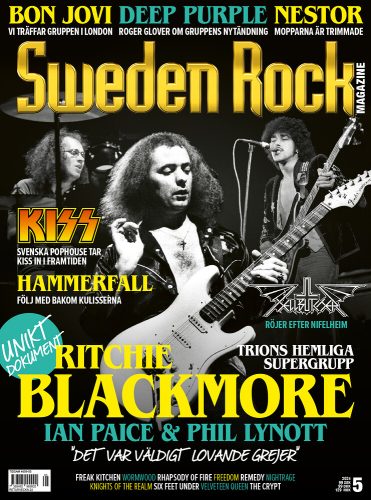
New Jersey Stage has an interview with Ritchie Blackmore and Candice Night on the occasion of their upcoming shows in the area. Not much in the sense of groundbreaking news in there, just a bit of Ritchie being Ritchie at the end:
When asked if there was a fan or two that really touched Ritchie over the years, he replied, “Yes, there was a fan that touched me – so I punched him in the nose!”
His music may have mellowed, but he’s still 100% rock and roll at heart.
#InfamouslyDry
Read more in New Jersey Stage.
Ian Paice spoke to the Classic Rock History on the occasion of upcoming new Deep Purple album =1. The meaning behind the album title, Steve Morse’s departure from the band, how Simon McBride fits in, the setlist, touring logistics, and life in general. Continue Reading »

A Tommy Bolin exhibition has opened at the Sioux City Public Museum. Many of the artifacts on display are from the collection of Bolin’s brother Johnnie.
What: Gypsy Soul: Remembering Sioux City’s Tommy Bolin
When: Friday, May 31, 2024 10:00 AM to Sunday, August 18, 2024 5:00 PM
Where: Sioux City Public Museum
607 4th Street Sioux City, IA, 51101 United States

Sound & Vision magazine (of an audiophilious inclination) has an interview with Dweezil Zappa on remixing Machine Head in Atmos surround.
Zappa’s Atmos mix of Machine Head—which has quite specifically and very deliberately been dubbed a “remix”—will most definitely challenge the ears of any Deep Purple fan, new or old, who knows the core album inside and out. As I noted in my review of the Machine Head box set (which will post here on S&V on June 7), the Atmos version of “Highway Star” is a balls-out ferocious assault wherein you can better discern the layers in Ian Gillan’s stacked lead vocal tracks, and then get blown over by the clockwise swoosh of the keys-and-guitar-solo section. You’ll also be riveted by the height-channel ascension of Ritchie Blackmore’s guitar solo during the forever-iconic “Smoke on the Water” and the full 360-degree dimensionality of Jon Lord’s literal keyboard clinic on “Lazy.”
Of course, there will be those listeners who don’t want to hear something quite so adventurous—and, hey, no one is stopping them from listening to the original version of Machine Head, if they so choose. But, just like Zappa, I prefer to be challenged as a listener whenever I enter the immersive arena in my listening room. “When you listen to the Atmos version in speakers, you really get to feel the immersive quality, versus what happens just in headphones,” Zappa clarifies. “One of the challenges in this format overall is you have compromises that have to be made when you encounter translation things that happen in headphones versus speakers. I think some people opt to let the headphones be the winner, but I feel like that’s not the way to go. I feel like the speakers should be the winner because, eventually, there are going to be more places where you’ll actually hear it in a speaker environment—and cars are probably going to be the main play.” (Let’s go space truckin,’ indeed. . .)
Read the first part of the interview in Sound & Vision. The second part is due some time later in June.

The latest (#44, June-July 2024) issue of the Rock Candy magazine has Q&A with Roger Glover, and a feature on Black Country Communion and their new album. The issue can be purchased directly from the publisher for £7 (plus £2 UK/£5 abroad postage for the dead-tree format). Continue Reading »
Ian Gillan talks about Deep Purple’s journey to musical freedom. This clip appears to be a part of the promotion campaign for the new album. Continue Reading »

Sweden Rock Magazine issue #5/2024 features the 1971 Blackmore/Paice/Lynott project Babyface as their cover story, with a seven-page feature inside. Also in the issue: 4-page feature on the current Deep Purple, with Roger Glover being interviewed. The magazine also mentions that “Glenn Hughes has finished writing the music for his first solo album since 2016”.
The magazine (which is, naturally, all in Swedish) can be ordered through the publisher.
Thanks to our editor emeritus Benny Holmström for the info.
Reprint of an article from New Musical Express, June 26, 1971, on Deep Purple’s visit to Iceland and review of the gig, in which the author reveals that he has absolutely no clue what Aurora borealis actually is. But that’s beside the point.
A trot round town revealed every record shop with its windows full of Deep Purple albums, kids selling Purple posters in the streets and signs advertising the concert everywhere. But we didn’t see one Eskimo, Igloo, Polar Bear or Rudolph, and felt quite cheated. On the other hand, the scenery was breathtaking and our hotel was situated across the bay from a snow-capped volcano that was last active 40 years ago.
In the dressing room prior to the concert, typical Purple humour broke out and I witnessed the amazing Jon Lord-Ian Paice mock wardance, a spate of tonking (a particularly sharp smack on the crown of the head), threats to Roger’s career, a decision to do away with Jon’s organ and switch Ian Gillan to electric piano (“Then we’ll get the same riff all night long,” – Jon) and fruity renditions of “Tie My Kangaroo Down, Sport” and even “Chirpy Chirpy Cheep Cheep.”
Roger gave me the honour of carrying his spare bass on stage for him and I was rewarded with a rousing cheer from the audience. As the group filed on, something akin to Beatlemania in volume greeted them.
Read more in My Things – Music history for those who are able to read.
Thanks to Geir Myklebust for putting this up.
Tony Iommi made an appearance on SiriusXM’s Eddie Trunk show on May 22, 2024, and was asked about the remix of Born Again. The master tapes for the album have been found nearly 3 years ago, yet we haven’t heard much of the progress. His answer didn’t shed much light on the matter either.
Well, eventually we got the tapes, but we couldn’t find them for years. We didn’t know where they were. And [my manager] located somebody, and they were in a record [company’s], in their archives tucked away somewhere in one of the record companies. I don’t know how they got them, but they did. And so eventually we got them, and then we’ve had them, or [we are] having them transferred, ’cause obviously it’s tape. And so we’re having them transferred so we can have a look at that. And that’s sort of a plan as well; I’d like to do that. And I know Ian would like that to happen as well. Well, Geezer [Butler, SABBATH bassist] would as well, I’m sure.
So, apparently everybody wants it to happen, yet here we are…
Thanks to Blabbermouth for the info and the quote.
Couple of interviews courtesy of Made in Metal. Roger Glover and Ian Gillan talk about Machine Head, Loosen My Strings, poetic licences, Ritchie’s shoes, and other interesting things. Continue Reading »
![[hand]](/hs-pics/portraits/hands/mcbride5.jpg)
![[face]](/hs-pics/portraits/faces/airey2.jpg)






 Unauthorized copying, while sometimes necessary, is never as good as the real thing
Unauthorized copying, while sometimes necessary, is never as good as the real thing